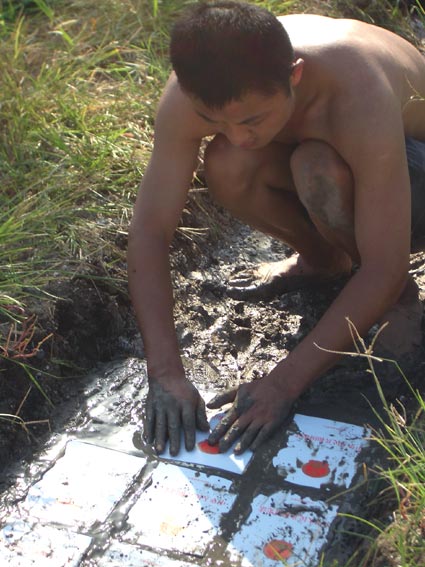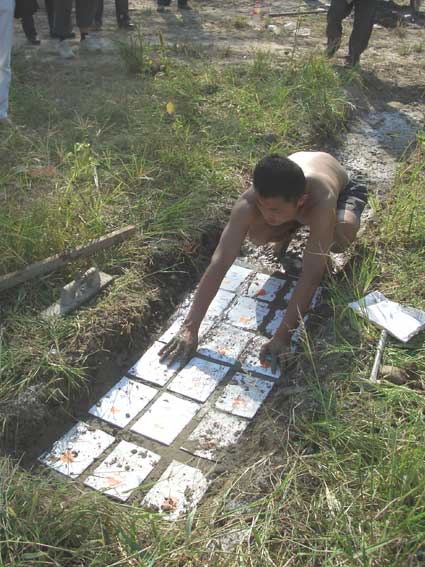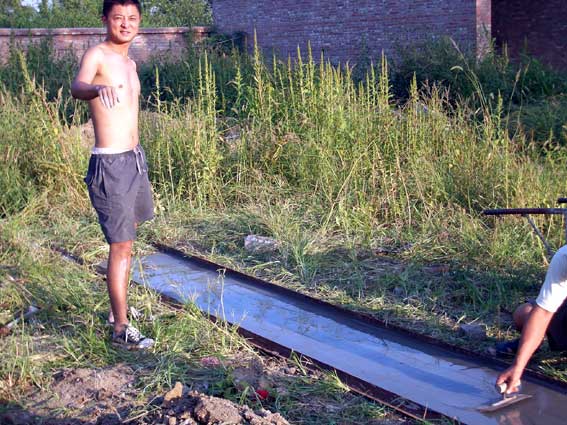


5th Open Performance Art Festival in Beijing,
The books are a lot of copy of Chinese constitution.
After Wang Chuyu covered with concret.
See another his performance in Hong Kong in 2002



The Constitution of the People's Republic of China (abstract)
CHAPTER I. General
Principles
Article 1. Socialist state
The People's Republic of China is a socialist state under the people's democratic dictatorship led by the working class and based on the alliance of workers and peasants.
The socialist system is the basic system of the People's Republic of China. Disruption of the socialist system by any organization or individual is prohibited.
Article 2. Power belongs to the people
All power in the People's Republic of China belongs to the people.
The National People's Congress and the local people's congresses at various levels are the organs through which the people exercise state power.
The people administer state affairs and manage economic, cultural and social affairs through various channels and in various ways in accordance with the law.
Article 3. Democracy
The state organs of the People's Republic of China apply the principle of democratic centralism.
The National People's Congress and the local people's congresses at various levels are constituted through democratic elections. They are responsible to the people and subject to their supervision.
All administrative, judicial and procuratorial organs of the state are created by the people's congresses to which they are responsible and by which they are supervised.
The divisions of functions and powers between the central and local state organs is guided by the principle of giving full scope to the initiative and enthusiasm of the local authorities under the unified leadership of the central authorities.
Article 4. Minority rights
All nationalities in the People's Republic of China are equal. The state protects the lawful rights and interests of the minority nationalities and upholds and develops a relationship of equality, unity and mutual assistance among all of China's nationalities. Discrimination against and oppression of any nationality are prohibited; any act which undermines the unity of the nationalities or instigates division is prohibited.
The state assists areas inhabited by minority nationalities accelerating their economic and cultural development according to the characteristics and needs of the various minority nationalities.
Regional autonomy is practiced in areas where people of minority nationalities live in concentrated communities; in these areas organs of self- government are established to exercise the power of autonomy. All national autonomous areas are integral parts of the People's Republic of China.
All nationalities have the freedom to use and develop their own spoken and written languages and to preserve or reform their own folkways and customs.
Article 5. Constitutional supremacy
The state upholds the uniformity and dignity of the socialist legal system.
No laws or administrative or local rules and regulations may contravene the Constitution.
All state organs, the armed forces, all political parties and public organizations and all enterprises and institutions must abide by the Constitution and the law. All acts in violation of the Constitution and the law must be investigated.
No organization or individual is privileged to be beyond the Constitution or the law.
Article 6. Socialist supremacy
The basis of the socialist economic system of the People's Republic of China is socialist public ownership of the means of production, namely, ownership by the whole people and collective ownership by the working people.
Article 7. State economy
The state-owned economy, i.e. the socialist economy with ownership by the people as a whole, is the leading force in the national economy. The state will ensure the consolidation and development to the state-owned economy.
Article 8. Communes and collectives
The rural contracted responsibility system based mainly on the household linking remuneration to output and cooperative economic forms ? producers', supply and marketing, credit and consumers' cooperatives ? are part of the socialist economy collectively owned by the working people. Working people who are all members of rural economic collectives have the right, within the limits prescribed by law, to farm plots of cropland and hilly land allotted for their private use, engage in household sideline production and raise privately owned livestock.
The various forms of cooperative economy in the cities and towns, such as those in the handicraft, industrial, building, transport, commercial and service trades, all belong to the sector of socialist economy under collective ownership by the working people.
The state protects the lawful rights and interests of the urban and rural economic collectives and encourages, guides and helps the growth of the collective economy.
Article 9. Natural resources
All mineral resources, waters, forests, mountains, grasslands, unreclaimed land, beaches, and other natural resources are owned by the state, that is, by the whole people, with the exception of the forest, mountains, grasslands and unreclaimed land and beaches that are owned by collectives in accordance with the law.
The state ensures the rational use of natural resources and protects rare animals and plants. Appropriation or damaging natural resources by any organization or individual by whatever means is prohibited.
Article 10. Ownership of land
Land in cities is owned by the state.
Land in the rural and suburban areas is owned by collectives except for those portions which belong to the state in accordance with the law; house sites and privately farmed plots of cropland and hilly land are also owned by collectives.
The state may, in the public interest, requisition land for its use in accordance with the law.
No organization or individual may appropriate, buy, sell or unlawfully transfer land in other ways. The right to the use of the land may be transferred in accordance with the law.
All organizations and individuals using land must ensure its rational use.
Article 11. Private economy
The individual economy of urban and rural working people, operating within the limits prescribed by law, is a complement to the socialist public economy. The state protects the lawful rights and interests of the individual economy.
The state guides, assists and supervises the individual economy by administrative control.
The state permits the private sector of the economy to exist and develop
within the limits prescribed by law. The private sector of the economy is a
complement to the socialist public economy. The state protects the lawful
rights and interests of the private sector of the economy, and exercises
guidance, supervision and control over the private sector of the econom
from The U.S.constitution Online http://www.usconstitution.net/china.html
WANG Chuyu (P.R.China)
©ARAIart.jp